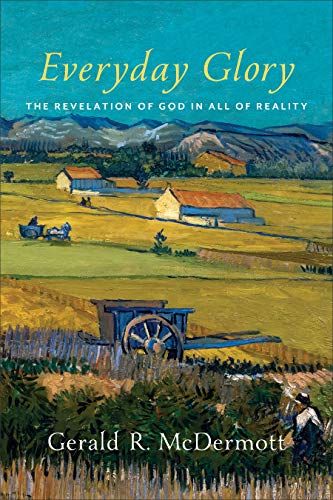Gerald McDermott born in Pittsburgh, is a professor at Beeson Divinity School. His favorite movie is “Ushpizin” (view the trailer here). They had a great dog named Jaffa, named after their favorite place in the world, Jaffa, Israel. His favorite smell is petrichor. Some of his favorite books, which he recommends widely, are Mr Blue, A Severe Mercy, Sabbath by Abraham Heschel, and the trilogy Jesus of Nazareth by Pope Benedict. His first job was at an ice cream parlor in 8th grade. He was fired because he did such a lousy job. When he’s not reading and writing and teaching theology, he loves running, the Boston Red Sox, being with his ten grandchildren, going to Israel (17 trips thus far), and spending time with his wife of 43 years. He grew up Catholic in Boston and New York, went to a Jesuit high school in New York City. During one of the summers he washed dishes on a Greek ship in the Aegean Sea where they worked 14 hours a day for 14 cents an hour. After college he joined a Christian commune where he met his wife. They lived in Christian communes for 9 (for her) and 7 (for him) years, and had their first two sons there. You can hear his podcast here and read a recent exchange on Israel here.
Seeing God in Everyday Glory: Sex, Leaves, Romance, etc.
Can you share the most compelling and exciting type/revelation of God that you yourself have seen and now follows you?
The Christ-like love where a human being sacrifices joyfully for someone who is unlovely is a type of the all-giving love between the Father and the Son that IS the Holy Spirit. This is a type of the divine beauty that fills this world.
You wrote the book “Everyday Glory: The Revelation of God in All of Reality”, and to be honest, after reading it I feel like I had a new set of eyes/category/sense awakened in me that I didn’t previously have. How did your own senses first become awake to finding, seeing, and enjoying “types” of God all around you in your normal everyday existence?
After reading Jonathan Edwards’s notebook “Images and Types of Divine Things” that focuses mostly on things in nature that he thought God put there to lift us up to his beauties, I started to see signs of God in the leaves on the tree in my front yard, in the sun that rises every day, in storms, in the beauty of the ocean especially during a storm, and in the love between people who would normally not be drawn to each other—especially after they had been enemies.
In the chapter on Sex, you said “…even when sexual intercourse seems fulfilling to each partner, both are sometimes left with a thirst for more. If not physical fulfillment, then more emotional and spiritual union with each other.” Can you help diagnose that phenomenon and show us how that points towards realities of God?
Even when a husband and wife enjoy sexual love, there is often the sense after that there must be more, that the pleasure was so fleeting and often incomplete—as if it is meant NOT to satisfy but to point us to something more. In other words, to suggest to us that spiritual union is so much more satisfying than physical union.
What is the “Gospel” and what practical implications does the Gospel make in my everyday life?
“Gospel” comes from a Greek word that means “good news.” Today we can say that the good news has so many dimensions. First, there is a loving and beautiful God who brought us into existence along with this world and who wants to fill us with his beauty and goodness and truth. On days when the world seems cruel and meaningless, this is GREAT news!
The good news is also that this God loves us despite our manifest selfishness and lack of love and beauty so much of the time. He can love us because His Son became the mediator who suffered the punishment we deserve so that God and we can become friends after being enemies. And that same Son lived a perfect life to earn for us an eternity with this beautiful God and all his saints, whom we can enjoy and get to now for eternity.
But before we get to heaven, there is so much more to this life, where we can “partake of the divine nature” through the Church and its sacraments, being filled afresh each week or even day with the body and blood of the Son of God, in other words his humanity and not just his divinity.
So the good news is that there is real love and real beauty and real goodness that we can gradually know and become part of. Our lives then have meaning and purpose. And because God gives us gifts, a unique set to each of us, we can play a role in this life in God’s work of redemption. We can know what Mother Teresa called “the joy of loving,” and see the church and the world changed a bit by what we do and are. That is joy. . . and good news.
What is “sin” and what is so terrible about it when I do sin? And what is my motivation to not sin?
Sin is disobeying God’s law, which is both written on our hearts and spelled out in holy scripture. It is a manifestation of self-centeredness, which is the opposite of what we were created for—to love the God of Israel and to love our neighbors.
Sin makes us less human, obedience makes us more human. So sin is partaking of darkness, drawing out of us the light that is to guide us into being more and more the image of the most loving person every, Jesus of Nazareth.
Sin is what takes life out of us, drawing us more and more into the darkness of nothingness that would have the world believe there finally is nothing beyond blind matter. It is a power that can take over us. The only way to escape its clutches is through the orthodox Church with its fearless preaching of Scripture and its life-giving sacraments.
What is God’s end goal for this world, all humans of this world, and me personally? Where is He taking it and what does it look like for me to be a part of that goal, and how can I have a role and purpose in that goal, and find meaning, and value, and my joy in that goal?
- God’s purpose for this world is two-fold—to glorify himself and to make his human creatures happy.
- These two purposes are actually and finally one and the same thing. For God is glorified when his human creatures find their joy in him, and that is the only way to finally be happy—to live in praise to him as the true Good, Beauty and Truth.
How can I, as a Christian who believes the Gospel and affirms orthodoxy, be compelled to genuinely desire God and the kingdom of God enough to become a true disciple, one who is willing to consider all things loss in comparison with knowing and loving Jesus?
Well, we might not like to hear it, but the way to desire more of God is to come closer to where He pours out his grace. That is in the Church, where Jesus speaks through orthodox preaching, and feeds his people thru the sacraments. The Fathers were adamant that sin is a terminal disease like cancer, and the only way to overcome it is to get what they called “the medicine of immortality” that comes in the humanity of Jesus through the sacraments. Feeding on Jesus through his Church and the means of grace it offers—Word and sacrament—is the best way to grow in God, which means becoming a true disciple.
The great temptation today is to think that we can be Lone Ranger Christians and grow outside of the orthodox Church. That is a myth that comes from the devil himself.
As a Christian, at the end of a long day (when I have done what I ought not to have done – and not done what I ought to have done) what are God’s thoughts of me when I lay down my head at at night and fall asleep?
God is like every loving father. He loves you and forgives you but loves you too much to ignore your sin. For he knows that if he does not deal with your sin by discipline (see Heb 12), you will remain in your sin and have a lousy life. And he has told us that “without holiness no one will see the Lord.” So he shakes his head over your sin, and plans to discipline you to get it out of you. Because he loves you he will discipline you. But he will not love you any less.
What is God’s mission given to us and how do I fulfill it without it becoming a feeling of another thing I have to do for God? And based upon that, What is needed at the personal, and church level to shape culture and to be on strategic mission?
- God’s mission is different for every one of us. Because God has a given each of us a different set of gifts. We must seek to discern what our particular mission is. Maybe it is to be a great Christian mechanic who is known for doing the best work. Or an excellent teacher. Or cook!
- For most of us, our primary mission is to be the best husband or wife, mother or father, we can be. We must constantly ask God for grace to do well on our mission, and use the means of grace the Church offers to help us fulfill our mission.
- Once we have discerned what our particular mission is, we won’t feel we “have” to do it. For it is God’s work and we have a special role to play in that work. What a privilege! What a joy! To know that what we do today, even if no one notices, will have a role to play in God’s work of redemption. He sees it, even if no one else does.
- Remember that when we are helping that kid or neighbor or customer, Jesus said that when we do anything as unto him we are really doing it for him. Especially when it is for “the least of these my brethren.”
What is the overarching story of the Bible?
- A holy God called a family headed by Abraham to share his holiness and be a beacon of light and love and beauty to the world. All of Abraham’s family was to be priestly, which means pointing the world to God. Gentiles (those not in this family naturally) joined that family all along by marriage or adoption. And whether they knew it or not, they were being aided by the future messiah of Israel. Once he came to earth, the call went out more directly to gentiles all over the world to join that family of Abraham. They could be adopted into the family by becoming one with the Jewish messiah, who would then adopt them into the family—thus sharing the beauty and love and truth of that holy God.
- Once in the family, they are called to live a distinctive lifestyle, empowered by the Spirit of the messiah of the God of Israel. They would join Israel as associate members, a beacon to the world of the only true Beauty and Truth.
For you personally, what has been the most compelling or powerful aspect of the story of the Bible that you delight in, has come to you fresh, and resulted in you loving God more and being excited to be a part of God’s story?
- In the last twenty years I have seen in new ways the importance of Israel and Jesus’ Jewishness. This has given me wholly new insight into the Good News and the history of the world.
- I have written about this in two books: The New Christian Zionism and Israel Matters. The second is short and easy to read.
For those who read this interview and get pricked of mind and heart; what can I do today, right now at this very moment (and beyond), that can result in the story of the Bible taking root in my own heart and shaping me as it has you?
I would suggest they get my book The Great Theologians or Seeing God. The first tells in plain language the story of theology, and the second is about spiritual discernment from Jonathan Edwards.
(that’s right, we asked him his fav songs, and these are them!)




